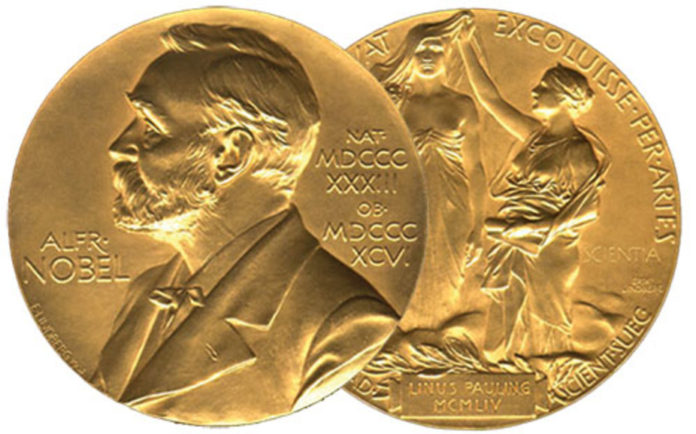
By Benjamin Burke, University of Hull
The Nobel Prizes in the sciences have been announced to much celebration around the world. And this year, unlike most years, controversies were largely avoided. And yet, the relevance of the Nobel Prize in the modern world can be questioned.
Since 1901, the Nobel Prizes have been awarded in the categories of Chemistry, Physics, Medicine, Literature and Peace, with the subsequent addition of Economics. The winners have included notable people such as Marie Curie, Max Planck, Albert Einstein, Ernest Hemmingway and Linus Pauling. Although such esteemed figures and contributions to society have unprecedented worth, are the Nobel Prizes in their current form the best way to celebrate academic and literary achievements?
Most often the criticism of Nobel Prizes is that either the achievement doesn’t warrant the commendation or the individual awarded should have been someone else. Although I sometimes agree with this notion, especially in undervaluing a particular individual’s role in an achievement, this reproach is subjective. These are topics we should argue about in the pub, rather than suggesting a format change.
Gender balance
The lack of representation of prize-winning females – less than 5% of all prizes have been awarded to them – has demanded a lot of attention across the years, most notably in situations in which it is widely believed that the contribution of male laureates in a particular award is at least equalled or surpassed by a female colleague who was overlooked.
The most famous example being the omission of Rosalind Franklin from the award for DNA structure determination. This issue is certainly not specific to the Nobel’s and is a much wider societal issue. That is why the solution to the problem will come not from the Nobel Foundation alone, but the research community as a whole.
Laureate limit
The prize is currently limited to a maximum of three Nobel laureates per award. A situation which is rarely questioned when speaking of the peace or economics prize. The question is, as modern science has developed more towards collaborative research, how can only three be selected as worthy and others not?
The situation of science is completely different from when the prize was setup according to Alfred Nobel’s will. Since then, individual scientists or small teams making big breakthroughs have nearly entirely disappeared. This has happened because the organisation of science has changed, with overlapping teams of collaborating principle investigators. Why is that only supervisors deserve the award and not the PhD student or post-doc? This obviously comes down to intellectual contribution. Who decides between these when few people are aware of others’ inputs?
The three-person laureate limit leads to a system whereby people miss out. but what is the alternative? If we remove the limit entirely, the problem is only moved down the line rather than solved. Should all of the thousands of researchers at the Europe’s largest particle accelerator, the Large Hadron Collider which is part of CERN, have won the Physics prize for the discovery of the Higgs boson in 2013? We are no closer to a solution. It seems to me that the “rule of three” is the strongest contested and most antiquated in relation to the modern systems of research and although having the rule so rigid causes controversy, it avoids absurdity.
Category expansion
The five original prizes (chemistry, physics, medicine, literature and peace) are certainly in the remit of Alfred Nobel’s will to bestow “prizes to those who … have conferred the greatest benefit on mankind”. Does this mean that there is nothing outside of these areas which fulfils this criteria?
The economics prize – officially called the Sveriges Riksbank Prize in Economic Sciences in Memory of Alfred Nobel – was only introduced in 1968 because the central bank of Sweden believed economists having a great benefit for mankind. Is it now time to expand again?
There are a range of candidate disciplines which are currently unrepresented including, but not limited to, mathematics, biology, environmental science and computer science. Could any of these areas be labelled as not conferring great benefit on mankind?
After introducing the Economics prize, the Nobel Foundation seems less than keen on the introduction of new prizes. They seem stubbornly regimented on their attempts to stick to both Nobel’s will along with non-will based tradition. It seems to me that this is to their detriment. The Nobel Prizes have a long tradition in celebration of developmental achievements with unprecedented prestige but if they refuse to move with the times, they are at risk of looking out of step with the modern world and their reputation may wane.
Others have launched prizes to upstage the Nobel Prize. The Fundamental Physics Prize by Yuri Milner, an internet entrepreneur, and the Breakthrough Prize, again by Milner but with a few other internet entrepreneurs, are attempts to ensure that a wider range of sciences benefit from recognition. Old prizes such as the Turing Prize or the Fields Medal are already considered the equivalent of the Nobel Prize for computer science and mathematics respectively.
Will the Nobel Prizes ever be superseded or sink into obscurity? I suspect not in our lifetimes, and nor do I want them to. Public celebration of achievements for societal good is something which should be increased rather than ridiculed or downplayed. But the Nobel Foundation could ensure that their relevance remains large by making some important changes.
![]()
Benjamin Burke does not work for, consult to, own shares in or receive funding from any company or organisation that would benefit from this article, and has no relevant affiliations.
This article was originally published on The Conversation.
Read the original article.




















